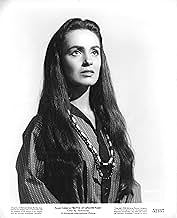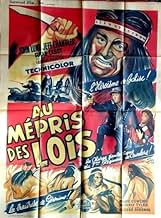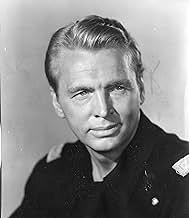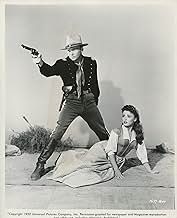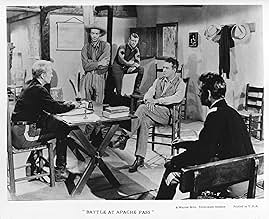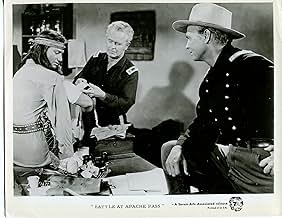When Cochise bands together with Geronimo and other Indian tribes, Major Colton abandons his fort, heading towards Fort Sheridan, through Apache Pass. The only thing in his way are the India... Read allWhen Cochise bands together with Geronimo and other Indian tribes, Major Colton abandons his fort, heading towards Fort Sheridan, through Apache Pass. The only thing in his way are the Indians he used to call his friends.When Cochise bands together with Geronimo and other Indian tribes, Major Colton abandons his fort, heading towards Fort Sheridan, through Apache Pass. The only thing in his way are the Indians he used to call his friends.
Gregg Palmer
- Joe Bent
- (as Palmer Lee)
- Director
- Writer
- All cast & crew
- Production, box office & more at IMDbPro
6.4801
1
2
3
4
5
6
7
8
9
10
Featured reviews
Just smoke the peace pipe
I didn't realize that this film merged a couple of real-life situations, so this scores points. It's the Cavalry versus the Indians, both of whom have some battle tricks up their sleeves. Can the Cavalry escape from the might of the combined Apache tribes after some devious shenanigans from both sides ruin a peace plan?
The cast carry out their roles well, apart from some wooden acting from Tommy Cook (Lillle Elk) who plays the brother of Cochise. Jeff Chandler (Cochise) does a good job as the Apache Leader and Jay Silverheels (Geronimo) is suitably ruthless as the rogue Apache warrior. Jack Elam (Mescal Jack) is also memorable as the weasel with no moral compass.
There are some interesting landscapes and moments of tension with good use made of the location to achieve this - a memorable scene has the Apache warriors just standing stationary as they wait for the glare of the sun to obscure the vision of the trapped Cavalrymen before they launch an attack. And it's all filmed in Technicolour which is always worth a point for a film.
I read a few reviews that said that "Broken Arrow" (1950) was a better film. How is that, then? Let me correct this for anyone reading. This is better than "Broken Arrow" which is essentially just a love story between a way-too-old James Stewart and a far-too-young Debra Paget.
The cast carry out their roles well, apart from some wooden acting from Tommy Cook (Lillle Elk) who plays the brother of Cochise. Jeff Chandler (Cochise) does a good job as the Apache Leader and Jay Silverheels (Geronimo) is suitably ruthless as the rogue Apache warrior. Jack Elam (Mescal Jack) is also memorable as the weasel with no moral compass.
There are some interesting landscapes and moments of tension with good use made of the location to achieve this - a memorable scene has the Apache warriors just standing stationary as they wait for the glare of the sun to obscure the vision of the trapped Cavalrymen before they launch an attack. And it's all filmed in Technicolour which is always worth a point for a film.
I read a few reviews that said that "Broken Arrow" (1950) was a better film. How is that, then? Let me correct this for anyone reading. This is better than "Broken Arrow" which is essentially just a love story between a way-too-old James Stewart and a far-too-young Debra Paget.
Good Western, well-photographed
This is a good cavalry Western, with a respectable cast and well photographed. John Lund may have got top billing, but Jeff Chandler has the better screen presence, and possibly Richard Egan too.
It contains a couple of common minor flaws of Westerns of the 1950s: the uniforms and carbines relate more to the 1870s than the early Civil War period, and Susan Cabot is yet another white American actor/actress who doesn't convince as a native American, especially compared with the "real Indian" women who briefly appear. Chandler is more convincing as Cochise,and complements well the Canadian Indian actor Jay Silverheels, best known as Tonto in the Lone Ranger series, where he always struck me as being a bit wooden; here he gets some dialogue and a couple of good fights (which he loses)) as Geronimo.
There's a suggestion of an instant romance between Lund and Beverly Tyler as the wagon-train survivor, but this is so feeble it might as well have been omitted.
The action scenes are well handled, especially the climatic battle in Apache Pass.
It contains a couple of common minor flaws of Westerns of the 1950s: the uniforms and carbines relate more to the 1870s than the early Civil War period, and Susan Cabot is yet another white American actor/actress who doesn't convince as a native American, especially compared with the "real Indian" women who briefly appear. Chandler is more convincing as Cochise,and complements well the Canadian Indian actor Jay Silverheels, best known as Tonto in the Lone Ranger series, where he always struck me as being a bit wooden; here he gets some dialogue and a couple of good fights (which he loses)) as Geronimo.
There's a suggestion of an instant romance between Lund and Beverly Tyler as the wagon-train survivor, but this is so feeble it might as well have been omitted.
The action scenes are well handled, especially the climatic battle in Apache Pass.
Good western adventure forever overshadowed by "Broken Arrow"
This colorful western is a rousing yarn that is one of the best of the 1950s. The picture is based on two historical events, the shameful Bascom affair, and the fight in Apache Pass in which two mountain howitzers foiled a well-planned ambush by the Indians. Cochise's Chiricahuas and the U.S. cavalry do all they can to keep peace in the southwest but renegade Mogollons and greedy, scheming whites are just as determined to cause trouble between the Apaches and the soldiers. Jeff Chandler reprises his role as Cochise in the landmark western, "Broken Arrow", as does Jay Silverheels as the warlike Geronimo. John Lund is the major who is sympathetic to the Indians and values his friendship with Cochise. Bruce Cowling and Jack Elam are the white men who have other ideas about how to deal with the Indians. Richard Egan and Hugh O'Brian are also good as army lieutenants. Tech credits are great, especially the camera work by Charles Boyle and the music score by Hans Salter.
Blessed are the peacemakers, they've got their work cut out for them
The Battle At Apache Pass is dependent on its verisimilitude for the notion that most Americans are ignorant of the fine points of the true story of the various American Indian wars. Broken Arrow took place in the early 1870s and it's where Tom Jeffords and Cochise formed a peace pact that included all the Apaches except those followers of Geronimo.
In this prequel the Civil War has come and a lot of soldiers are ordered back to fight in the east. Some ambitious people on both sides like Geronimo for the Apaches and Bruce Cowling a political hack Indian agent with ambitions to be territorial governor try to break an informal peace established by the friendship of Major John Lund and Cochise as played by Jeff Chandler who returns as Cochise. Jay Silverheels as Geronimo is the only returnee from Broken Arrow.
The Battle At Apache Pass is not in the same league of greatness as Broken Arrow, but it still is a pretty good western. If the film has a moral it is blessed are the peacemakers because they have their work cut out for them. It doesn't take much to start a war, but a lot of work and sacrifice is needed to end one. There are enough examples in real life right down to today to affirm that notion.
Through it all Lund and Chandler retain a mutual respect for each other and both are afforded the opportunity to save the women that each other loves, Beverly Tyler for Lund and Susan Cabot for Chandler.
Besides those I've already mentioned, standing out in the supporting cast is Jack Elam at his squinty eyed evil best as a scout working for Cowling and Richard Egan as a tough, but compassionate sergeant. His scenes with Susan Cabot where he shows her a world of respect as due the first lady of a nation have a lot of depth to them.
Not as good as Broken Arrow, but still a fine western The Battle At Apache Pass holds up very well for today's audience.
In this prequel the Civil War has come and a lot of soldiers are ordered back to fight in the east. Some ambitious people on both sides like Geronimo for the Apaches and Bruce Cowling a political hack Indian agent with ambitions to be territorial governor try to break an informal peace established by the friendship of Major John Lund and Cochise as played by Jeff Chandler who returns as Cochise. Jay Silverheels as Geronimo is the only returnee from Broken Arrow.
The Battle At Apache Pass is not in the same league of greatness as Broken Arrow, but it still is a pretty good western. If the film has a moral it is blessed are the peacemakers because they have their work cut out for them. It doesn't take much to start a war, but a lot of work and sacrifice is needed to end one. There are enough examples in real life right down to today to affirm that notion.
Through it all Lund and Chandler retain a mutual respect for each other and both are afforded the opportunity to save the women that each other loves, Beverly Tyler for Lund and Susan Cabot for Chandler.
Besides those I've already mentioned, standing out in the supporting cast is Jack Elam at his squinty eyed evil best as a scout working for Cowling and Richard Egan as a tough, but compassionate sergeant. His scenes with Susan Cabot where he shows her a world of respect as due the first lady of a nation have a lot of depth to them.
Not as good as Broken Arrow, but still a fine western The Battle At Apache Pass holds up very well for today's audience.
" If one famous Indian leader is dangerous, you can be sure, two of them are Lethal "
Hollywood in the 1950's was in the throws of changing the mystic conception that White men were always beating the Native Americans in war. In this film called " The Battle at Apache Pass " is one of the new attempts at glorying the U.S. Calvary's version of that now infamous battle. To be sure, the movie portrays the Indian as an undisciplined savage out to kill every white man and the U.S. cavalry as military pawns of opportunistic land grabbing marauders. However, within the ranks of the Apache are two of the more notorious names who's names are inscribed in Western Lore. This movie purports to have Geronimo (Jay Silverheels) and Cochise (Jeff Chandler) engaged in battle with Maj. Jim Coltton (John Lund and George Bascom (John Hudson) using the first use of western field cannons. The dialog between the Whites and Indians is standard Hollywood, but does depict some of the actual atrocities committed on both sides. This is a good attempt of the evolution of western films and with the addition of James Best, Regis Toomey, Hugh O'Brian and Richard Egan in it's cast, manages a plausible rendition of a historical event. ****
Did you know
- TriviaThe story combines two real-life elements, one that happened in 1861, the other (the battle) in 1862, making this something of a prequel to Broken Arrow (1950). The events in that film took place in 1871 and 1872. Jeff Chandler and Jay Silverheels reprised their roles from the previous film, as Cochise and Geronimo respectively.
- GoofsAlthough the movie does contain historical accuracy with Cochise and Lt. Bascomb it errs on the designation of the guidons belonging to the 7th Cavalry. Custer's 7th never fought anyone but Plains Indians.
- ConnectionsFeatured in Room 237 (2012)
- How long is The Battle at Apache Pass?Powered by Alexa
Details
- Release date
- Country of origin
- Language
- Also known as
- Venganza Apache
- Filming locations
- Arches National Park, Utah, USA(all the battle scenes in this production were actually photographed at Arches National Monument Park)
- Production company
- See more company credits at IMDbPro
- Runtime
- 1h 25m(85 min)
- Aspect ratio
- 1.37 : 1
Contribute to this page
Suggest an edit or add missing content


